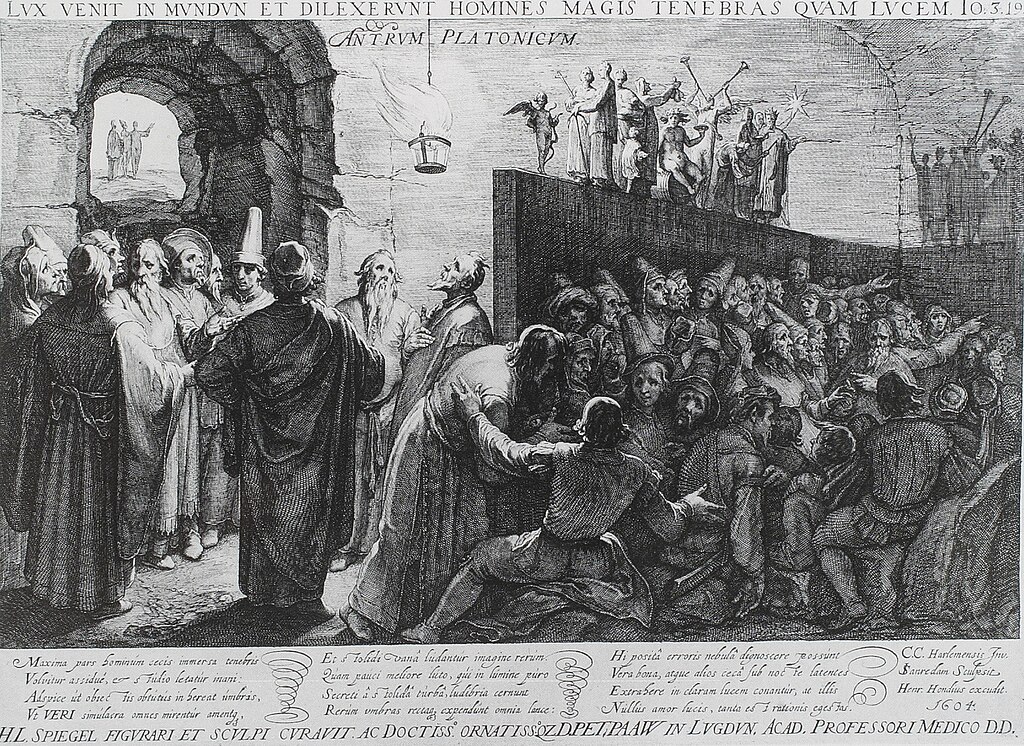
Allegory of the Cave painting by Jan Saenredam (1604, Vienna).
Shown in lecture on 02/10/14.
(Found on Wikipedia)
The 'Story':
Setting: An underground chamber (much like a cave),
Within the cave are prisoners who have occupied it since childhood. Tied by their necks and legs, they are restrained so much so that they can only look ahead.
In front of them is a curtain wall which stands in front of a fire. Between these, is a road which many people carry many objects down and indulge in conversation with one another. This then creates shadows on the walls of the cave for the prisoners to somewhat 'unwillingly' watch.
("...like the screen at puppet shows between the operators and their audience." pg.317)
Due to the early aged imprisonment, these people have become to believe that the shadows they see are actually the 'real world' or the 'true reality'. They have stopped questioning what is shown and have decided for themselves what is real.
The shadows are their world. The shadows are what exist.
The twist comes when one of the prisoners escapes and stumbles upon the 'real' world.
Not ever experiencing sunlight before, the escapee is left temporarily blind, slowly and gradually adjusting to the bright light and all of the new sights of this unusual world. (although he could have easily rejected these new things as 'untrue' due to the discomfort the new world was bringing, the story continues with the escapee excepting that this was the world of 'true reality', unlike the cave...)
Once he has regained his sight, however, he is then left with a new dilemma.
Should he return to tell the others in the cave of the wonders he has discovered? To show them that the world they believed in was only being kept alive due to their unquestioning minds? Or to never return to the darkness of the cave and continue living within this 'reality'?
The outcome could only go one of two ways - the other prisoners would believe their friend to be true and follow him to 'reality' ("...he would congratulate himself on his good fortune and be sorry for them...certain amount of honour and glory to be won among the prisoners..." pg.319) or, they would label the escapee as a liar, a madman and kill him as soon as they had the chance. ("...visit to the upper world had ruined his sight...they would kill him if they could lay hands on him." pg.320)
There is no certain end to this part of the story. Instead we, the reader, are left with a philosophical message to think of...
Meaning behind 'Simile of the Cave':
The 'story' of the cave described is actually a 'story within a story' (French call this 'mise en abyme'), being told between Plato's brother, Glaucon and his mentor, Socrates.
The cave is simply a simile for Socrates to explain his theory to Glaucon, that we the people, (or in this instants, the 'prisoners') do not control or know reality, but that there is a higher power beyond us that does (Socrates calls this the "...intelligible region." pg.321).
Much like the prisoners and the shadows, this idea can be applied to today's world through devices such a movie theatre or even TV. The viewer no longer questions what they are being shown, but simply applies their own labels or experiences to the staged situations they are witnessing.
The reality becomes blurred and distorted through us, so therefore we cannot surely be in control.
Applying 'The Cave' to 'real' life:
This theory of a higher power becomes applied and explained once again towards the end of the chapter/verse by Socrates, when he gives us another alternative example of the distortion of 'reality', this time through the idea of government (whom he labels "...excellences.." or "...intellectuals..." pg.322/323). The difference with this example, however, is that Socrates also offers a 'solution' - which he believes could potentially help the distortion on 'reality' to be 'minimized'; Philosophers are the closest minds to "intelligible region'' and should therefore govern. ("...we shan't be unfair to our philosophers...better qualified to combine the practice of philosophy and politics." pg.324).
In summary, Plato (using the identity of his mentor, Socrates), is claiming that we, the "lawgivers" (pg.323), give power to those who are only in it for rewards, rather than those of the 'enlightened' and 'good' mind (such as philosophers), allowing for our 'realities' to become untrue. ("...society will never properly be governed by the uneducated...the intellectuals..." pg.323)
We are essentially prisoners believing the shadows, when the real world is somewhere else.
No better lines explain this than the last of these on page 325:
Socrates: "Who else, then, will you compel to undertake the responsibilities of Guardians of our state, if it is not be those who know most about the principles of good government and who have other rewards and a better life than the politicians's?"
Glaucon; "There is no one else."
Bibliography:
Plato (Author) The Republic (Translated by Desmond Lee, 2007) Penguins Classics.
Anon (N.D) Story Within a Story [Online] http://en.wikipedia.org/wiki/Story_within_a_story
Anon (2014) Allegory of the Cave [Online] http://en.wikipedia.org/wiki/Allegory_of_the_Cave
No comments:
Post a Comment